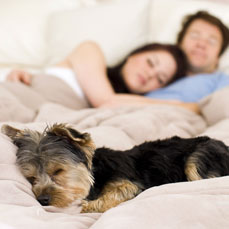Reviewed and fact checked by Bruce Whittle, DVM
How to Handle Your Puppy's Separation Anxiety
Your puppy is officially home! It's an exciting day full of cuddles, playtime, and adorable photo opportunities; and now it's time to go to bed. You may be surprised to hear the welcome home party continues into the night. Shortly after putting the puppy in his or her crate or bed, your little party animal doesn't want to go to sleep but rather makes their presence known with sounds of whining or even crying. While the noise can sound heartbreaking, don't panic! Consistent whining, howling, or crying throughout your puppy's first few nights at home is extremely common and to be expected.
Puppy is experiencing separation anxiety from their biological family, which while upsetting, is a completely normal part of adjusting to their new home. It helps to understand that these distressed sounds are a natural evolutionary expression. In the wild, a puppy separated from his family may get attacked or killed by predators; so, to discourage his mother from leaving him, the puppy cries to ensure survival.

Creating a Secure Sleeping Environment for Your Puppy
Since night one in a brand new environment is a big transition for a puppy (rest assured, they will get more and more comfortable in the coming days and weeks), it's your job as their new parent to make them feel secure. To that end, do not put them in a room further away from you to drown out the noise - this could contribute further to the puppy's anxiety and potentially cause behavioral problems at a later date. Instead, bring their crate or bed into your bedroom or just outside the door so they feel less isolated. You'll also have the added benefit of being able to check on them regularly. Some sensitive new parents may be tempted to bring the puppy into their own bed- but unless you want to make this a habit*, it's important to resist the urge and keep the puppy in their own sleeping space. There is a difference between creating a sense of security and coddling.
Once creating a secure environment for the puppy, it's best to try and ignore the puppy's whines and cries as much as possible. Take a hot shower, turn on the TV, or play a game to try and take your mind off the noise. In these early nights, distractions are key to not only keeping yourself sane and patient but also setting a healthy foundation and schedule for the puppy. Plus, if the puppy gets too much attention (or worse, is rewarded with food or treats) while exhibiting this behavior, they will quickly learn that barking or crying is the way to get what they want.
If whining or crying becomes excessive, calmly and firmly say "No, go to sleep" in a low, controlled tone, without expressing frustration. If repeated several times at night for many consecutive nights, they will learn to obey in the coming weeks. Once you get through the night, pat yourself on the back, and then quickly take the puppy outside for their much-needed and well-deserved morning walk and bathroom break!
Remember to put yourself in the puppy's "paws" and have sympathy for how they must be feeling their first night in a new place. It's most important for the puppy to know that they are loved and cared for - with this reassurance, they will attach to you, learn to trust you and become a loyal and affectionate dog.
It's also important to embrace the hard first few days as all part of the exciting new adventure of raising a new puppy as your own. Before you know it, your puppy will be grown and you'll long for the days of puppyhood - sleepless nights and all!
*PS places no judgment on families who want their dogs to sleep with them in the same bed. We recognize there are many benefits including but not limited to free snuggle sessions, extra warmth, and emotional comfort.

